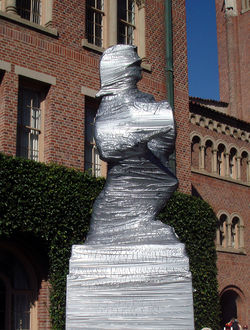This article needs additional citations for verification .(October 2009) |
| Tommy Trojan | |
|---|---|
 | |
| Artist | Roger Noble Burnham |
| Medium | Bronze sculpture statue |
| Location | Los Angeles, California, United States |
Tommy Trojan, officially known as the Trojan Shrine, is one of the most recognizable figures of school pride at the University of Southern California in Los Angeles, California, United States. The life-size bronze statue of a Trojan warrior stands in the center of campus and serves as a popular meeting spot, as well as a centerpiece for a number of campus events. It is the most popular unofficial mascot of the university.

